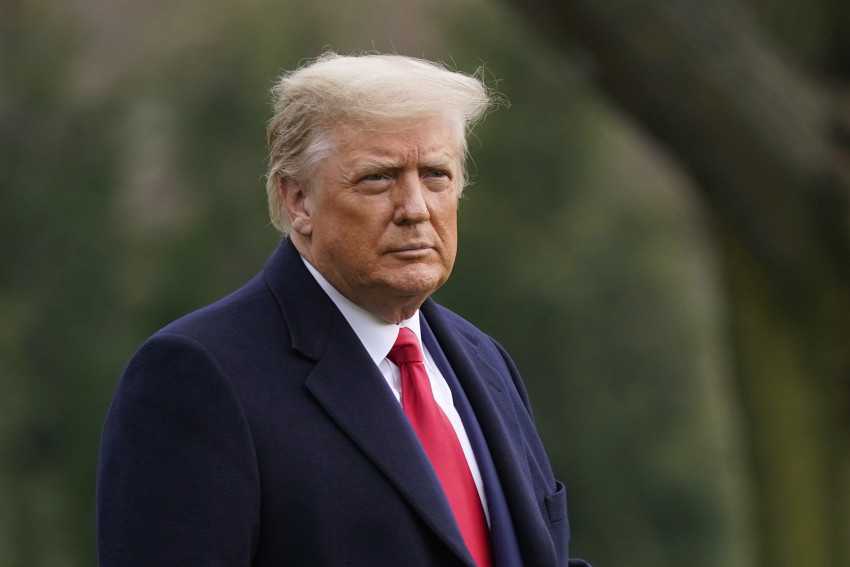House votes to override Trump's veto of protection bill
29 December, 2020

The Democratic-controlled House voted overwhelmingly Mon to override President Donald Trump’s veto of a defense policy bill, setting the stage for what will be the first veto override of his presidency.
House members voted 322-87 to override the veto, good above the two-thirds had a need to override. The Senate, which is likely to vote on the override this week, also needs to approve it by a two-thirds majority.
Trump rejected the protection bill last week, saying it didn't limit social media firms he promises were biased against him during his failed reelection advertising campaign. Trump also opposes vocabulary which allows for the renaming of armed service bases that honor Confederate leaders.
The defense bill, referred to as the National Defense Authorization Act, or NDAA, affirms 3% pay raises for U.S. troops and authorizes a lot more than $740 billion in military programs and construction.
House Loudspeaker Nancy Pelosi, D-Calif, said following the vote that the House had done its portion to guarantee the NDAA becomes rules "despite the president’s dangerous sabotage efforts.''
Trump's “reckless veto could have denied our service people hazard-duty pay,'' removed key protections for global peace and security and ”undermined our nation’s values and work to combat racism, by blocking overwhelmingly bipartisan actions to rename armed service bases,'' Pelosi said.
Sen Jim Inhofe, R-Okla, chairman of the Senate Armed Companies Committee, called the costs “absolutely vital to your national protection and our troops,'' adding, "Our women and men who volunteer to wear the uniform shouldn’t get denied what they want - ever.”
Trump has succeeded throughout his four-year term found in enforcing party discipline found in Congress, with few Republicans ready to publicly oppose him. The bipartisan vote on the generally popular defense bill confirmed the limits of Trump's affect in the final weeks before he leaves office, and came a few minutes after 130 House Republicans voted against a Trump-supported intend to increase COVID-19 relief checks to $2,000. The House approved the bigger payments, but the method faces an uncertain future in the Republican-managed Senate, another sign of Trump's fading carry over Congress.
Trump features offered a number of rationales for rejecting the protection bill. He urged lawmakers to impose limits on Twitter and additional social media firms he claimed happen to be biased against him, aswell concerning strip out language which allows for the renaming of armed service bases such as Fort Benning and Fort Hood that honor Confederate leaders. Trump likewise claimed without evidence that the biggest winner from the security bill will be China.
In his veto message, Trump also stated the bill restricts his capability to conduct foreign policy, "specifically my efforts to take our troops home.'' Trump was discussing provisions in the bill that impose circumstances on his intend to withdraw a large number of troops from Afghanistan and Germany. The steps need the Pentagon to send reports certifying that the proposed withdrawals wouldn't normally jeopardize U.S. countrywide security.
The veto override was reinforced by 212 Democrats, 109 Republicans and an unbiased. Twenty Democrats opposed the override, along with 66 Republicans and an unbiased.
House GOP Innovator Kevin McCarthy of California missed the vote, but Wyoming Rep Liz Cheney, a member of Republican leadership, supported the override, as did Rep Mac Thornberry of Texas, the top Republican on the House Armed Companies panel. Thornberry is normally retiring this season and the expenses is known as in his honor.
The Senate approved the bill 84-13 earlier this month, well above the margin needed to override a presidential veto. Trump possesses vetoed eight various other bills, but those were all sustained because supporters didn't gain the two-thirds vote wanted in each chamber for the bills to become law without Trump’s signature.
Rhode Island Sen. Jack Reed, the top Democrat on the Senate Armed Solutions Committee, explained Trump’s declaration that China received from the security bill was false. He also observed the shifting explanations Trump possessed given for the veto.
“From Confederate base names to social mass media liability provisions ... to imaginary and easily refutable expenses about China, it’s hard to keep track of President Trump’s unprincipled, irrational excuses for vetoing this bipartisan bill,'' Reed said.
Reed named the Dec. 23 veto “Trump’s parting surprise to (Russian President Vladimir) Putin and a lump of coal for our troops. Donald Trump can be showing even more devotion to Confederate basic names than to the males and females who defend our country.''
Rep. Adam Smith, D-Clean., chairman of the House Armed Providers Committee, said Trump's veto "managed to get clear that he does not care about the needs of our military staff and their families.''
The measure guides Pentagon policy and cements decisions about troop levels, new weapons systems and armed service readiness, personnel policy and other military goals. Many courses, including military development, can only get into effect if the costs is approved.
Senate Majority Head Mitch McConnell, in a uncommon break with Trump, had urged passing of the defense bill despite Trump’s veto threat. McConnell said it was important for Congress to keep its nearly six-decade-prolonged streak of passing the security policy bill.
Source: japantoday.com
TAG(s):
